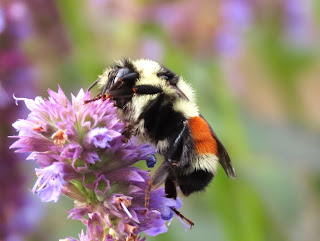NATURE
MONCTON NATURE NEWS
October 5,
2023
To respond
by e-mail, please address your message to the information line editor, nelsonpoirier435@gmail.com .
Please
advise both the editor at nelsonpoirier435@gmail.com and the proofreader nicholsl@eastlink.ca if any
errors are noted in wording or photo labelling.
For more information on Nature Moncton, check the website at www.naturemoncton.com .
Edited by
Nelson Poirier nelsonpoirier435@gmail.com
Proofreading
courtesy of Louise Nichols at nicholsl@eastlink.ca
**
Being sick with a bad cold, Jane LeBlanc hasn't left her St. Martins yard
for a week or so. She noted another Monarch Butterfly hatched on Sept. 26. Of
the 4 successful hatchings, all four were male. She also notes that as big as her
Common Milkweed patch is, there isn't a single seedpod forming.
Maybe because of the wet summer??
She is
still seeing many bees and other pollinators enjoying the warm, dry weather. A Red
Admiral Butterfly made an appearance Wednesday along with a
young-of-the-year Common Yellowthroat Warbler that was willing to be photographed.
**Shannon Inman photographed a fresh-appearing Mourning Cloak Butterfly on Wednesday. This species of butterfly will overwinter as an adult, as it appears in Shannon’s photo. Shannon also got a nice photo of a Tri-coloured Bumblebee enjoying the still-blooming Anise Hyssop plants in their garden.
Shannon comments that several pollinators are very attracted to the Anise Hyssop blooms.
Dave
MacLeod has given a nice commentary on this caterpillar larvae commenting "This is a caterpillar of the Galium Sphinx or
Bedstraw Hawk-moth (Hyles gallii).
All sphinx or hawk-moth caterpillars are known as ‘Hornworms’ because they all
have a pointed horn of different colours on the upper side at the rear
end. In this case, it is red. The most common food plants are
bedstraws (Galium spp.) in the Madder Family
(Rubiaceae), and members of the Evening-primrose Family (Onagraceae) like
fireweed (Epilobium angustifolium)."
Although
there is a tremendous variation in the ground colour of different individual
caterpillars of this species, varying from light brown to black (as in this
case), they all have a red horn. This variation is illustrated by four
photos halfway down this BugGuide page, which also shows the adult moth: https://bugguide.net/node/view/31976
Here’s one
from Quebec, that looks similar to the one in Aldo’s photo (or are they two
different individuals?) feeding on a bedstraw plant that has 4 –8 leaves in
whorls around the main stem: https://bugguide.net/node/view/1405207
And here’s
another similar one from Peterborough, Ontario: https://bugguide.net/node/view/1580743
**
On Tuesday, Brian Stone walked along the service road beside the CN rail
tracks along the west end of Main St. in Moncton. He noticed an
interesting situation involving Woolly Bear Caterpillars that were
numerous along the road. He saw many caterpillars, and all of them were
crossing the road (as fast as their little caterpillar legs would take them)
from south to north in the same direction. As they approached the actual tracks
on the Moncton side of the road, they came up against a long strip of ribbon
rail that had been laid down beside the track for a likely future replacement
job. As they climbed up onto this stretch of unbroken ribbon rail, they seemed
to not be able to navigate their way over the extended top lip of the rail and
turned to try to walk to the end of the rail. That would be a long journey for
such a little critter on such a long piece of rail. Interestingly, all the
caterpillars turned the same way, towards the west, and were all walking along
the rail separated by about 15-foot intervals in their own version of a ‘train’
running along a rail.
Brian also
looked away from this event long enough to include photos of a faded Clouded
Sulphur Butterfly, a Milkweed Pod burst open to seed, and some
bright Highbush Cranberries.
Nelson Poirier
Nature Moncton
.%20OCT%204,%202023.%20JANE%20LeBLANC.JPG)
.%20OCT%204,%202023.%20%20JANE%20LeBLANC.JPG)




.JPG)

.JPG)




No comments:
Post a Comment